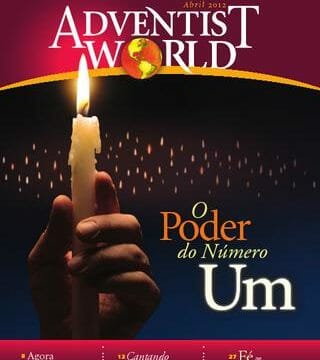Our lives and witness offer the continuation of the cosmic conflict, adding a small piece to the puzzle.

An abundance of voices assaults us from every corner. These voices can be heard in every conceivable media—time-tested print, fast-moving social media, heart-thumping video, or mind-engaging audio. Some of these voices shout; others whisper. They all seek to get our attention, for they want to tell us a story.
Scripture is only one voice among the many—and yet it is the completely different one. It plots awe-inspiring divine interventions and some great human exploits. It lets us see the highs and lows of human history and is unabashedly honest and transparent as it points us to God’s persistent story line. It goes like this: God is love—and this love wants to communicate itself to us! We often call this story line the “cosmic conflict,” or the “great controversy,” for it moves from the perfection of Heaven’s throne room to a perfect garden on a newly created blue planet to the devastation of the Fall and the post-Flood world.
In the center of God’s story line we see a cross standing on a hill outside the gates of Jerusalem with the God-man Jesus hanging with His arms spread out. As we consider Jesus’ death and resurrection, we need to recalibrate our mixed emotions. We hear Him say to the former demoniac on a shore next to Lake Galilee: “Go home to your friends, and tell them what great things the Lord has done for you, and how He has had compassion on you” (Mark 5:19). We also hear the psalmist exclaim: “My mouth shall tell of Your righteousness and Your salvation all the day, for I do not know their limits” (Ps. 71:15).
And suddenly we get it. God’s story didn’t finish on the cross or when Martin Luther nailed his 95 theses on a door of the Wittenberg church or when William Miller and thousands of Advent believers looked in anticipation up into the sky on October 22, 1844. God’s story is our story too. “To be continued” is not just part of the closing credits of a TV series or found on the last page of a cherished volume. Our lives and witness offer the continuation of the cosmic conflict, adding a small piece to the puzzle. That’s the reason we are called to share our stories in the larger context of God’s story with our children. While my story or your story may be distinct from Moses’ or Daniel’s story, it’s part and parcel of the continuation of God’s plan to save this world.
Listen to the way Ellen White put it: “Each has his place in the eternal plan of heaven. Each is to work in cooperation with Christ for the salvation of souls. Not more surely is the place prepared for us in the heavenly mansions than is the special place designated on earth where we are to work for God.”*
Yes, your story—my story—is unique and uniquely needed. Someone, somewhere, needs to see, hear, or even just observe that story and be encouraged to step into the story line that will be continued into eternity.
* Ellen G. White, Christ’s Object Lessons (Washington, D.C.: Review and Herald Pub. Assn., 1900, 1941), pp. 326, 327.








